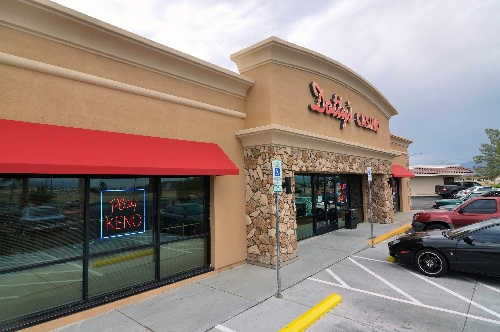Vote on Dotty’s model due

After months of posturing and heated public debate, proposals for new rules on slot machines in Nevada taverns boil down to one simple question: Will state regulators tell operators of Dotty’s Gaming & Spirits, and owners of similar businesses, to add a bar that seats nine patrons?
That’s become the crux of the argument heading into today’s Nevada Gaming Commission meeting in Las Vegas. Commissioners are to take up a list of proposed changes to State Gaming Regulation 3.015, which governs the operation of 15 slot machines or fewer in restricted locations — facilities that are not a traditional casino.
Gaming commissioners took input during a hearing on proposed changes to the regulation offered jointly by the Nevada Resort Association and Nevada Tavern Operators Association. The changes would describe various components of a tavern.
A majority of the five-member commission appeared ready to revise the regulation.
"We think they will make some changes," resort association President Virginia Valentine said. "There seems to be an appetite to do something."
Proposed changes include requiring taverns to have 2,000 square feet of public space, 20 seats not associated with gaming, a restaurant 12 hours a day or a bar that seats at least nine patrons. The proposals affect all new taverns. Those operating before February 2000 would be exempt. However, all taverns starting business after February 2000 would have to comply with the changes.
Dotty’s started business in 1995, but it has 53 newer taverns where a bar would have to be added. Currently, the Dotty’s restricted location business model includes 15 slant-top-style slot machines with cushioned chairs and a counter for sale of packaged foods and drinks, both alcoholic and nonalcoholic.
Dotty’s Chief Operating Officer Mike Eide said adding bars would cost the company $6 million. It is also not what Dotty’s customers want to see.
"Our model is grandma’s kitchen, not your typical sports bar tavern," he said.
Dotty’s officials have argued against any changes to Regulation 3.015, but seem resigned to some revision.
Eide said the company plans to open kitchens at several facilities because state lawmakers in June relaxed a statewide ban on smoking where food is served. The measure, backed by the tavern association, allows taverns to reopen their closed kitchens and offer food service for patrons older than 21.
Forcing the company to build bars, however, will cause Dotty’s to re-evaluate its operations.
Sean Higgins, the attorney for the tavern owners, said making the bar requirement retroactive is necessary or else Dotty’s — or any other tavern operator — could get an older location and convert it to Dotty’s model. Gaming regulators can go back to locations and require the license holder to change a facility or a system at any time. Higgins, who operates the Three Angry Wives taverns, said that gaming regulators required taverns to have alcoves at their locations.
"A gaming license is a gaming license, whether or not its restricted or nonrestricted," Higgins said. "The regulators have the ability to go back and make whatever changes they deem necessary."
The argument over Dotty’s centers in part on rules that slot machines be "incidental" to a primary business. Higgins said tavern owners and the resort association believe a definition of a tavern is needed. They believe locations for Dotty’s, which are classified as taverns, are in reality slot machine parlors.
"I don’t think they were legal from the start, and I’ve been doing restricted locations for 21 years," said Higgins, who had been general counsel for slot machine route operator Herbst Gaming, which is now Affinity Gaming.
"If you took all the slot machines out of my tavern, I would still have the bar and restaurant?" Higgins said. "If you took all the slot machines out of Dotty’s, then what’s left?"
Contact reporter Howard Stutz at hstutz@reviewjournal. com or 702-477-3871. Follow @howardstutz on Twitter.












